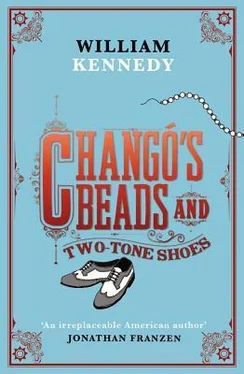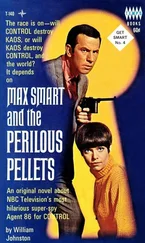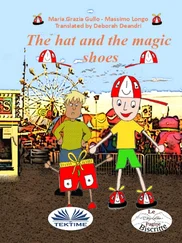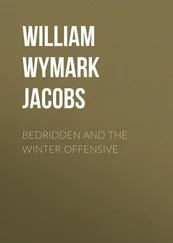This is taking place in the main room of this modest wooden house that Arsenio built for his old wife long ago. Chairs have been pushed to one wall. A table, with a white cloth covering it, is serving as an altar and is set out with two coconuts and a hammer, two stones, a glass of water, several bowls, one with water, two with offerings to the Orishas being summoned. Changó’s is the second bowl, which is wooden so it won’t break. Changó can be rowdy. Both these bowls are full — with beads and sunflowers and small cups of honey, plus herbs and other elements Quinn cannot identify. Behind the table a large fabric, red and light blue, has been hung to transform the room, and there is a festive quality here.
Quinn is fixated on Renata, who is totally absorbed by it all; and she is scoring dance points with Quinn by her effective emulation of Floreal’s moves, which isn’t easy. Quinn is reveling in Renata’s aesthetic control of her body. Grace and beauty prevail in all realms of her being, it seems to him. He is exploding with love for her; and immersed as he is in all this mumbo-jumbo, he would not be surprised to see his love materialize somewhere in this room in the shape of an idea, a corporeal rendering of his possibly insane desire. He would not go on record at the moment as to his own sanity.
Renata had told him she did not like to dance and would not dance with him. But she lied, or perhaps she just changed because of the impulse that started her dancing yesterday in her hotel room and took hold of her again here when Ezequiel’s drum began singing to her and Floreal’s chant and elegant movement brought her to her feet.
Quinn is also on his feet now, dancing with Renata at a distance, he too emulating Floreal’s steps; and he feels the power of this dance. He is with its beat, which is a slow mambo, he has definitely decided — you go with what you know. Floreal gave Quinn a small smile because of the way he was swaying his hips, not bad was his reading of her glance. His only exotic dance specialties were the merengue and the rumba, but soon he’d really nail this mambo, and maybe even the salsa, what the hell, he was in Cuba.
Moncho knew all about the involvement of Ezequiel and Floreal in Santeria from his time in Los Negros, and he approached them at their home to do this rite for Quinn and Renata. Moncho first thought he should dissuade Renata from this hasty marriage, she being so young and tempted. But as a believer in irrational love he offered no objection. Also, he had taken a liking to Quinn who is a bit strange, but seems to know what he wants — that fixation of his on babalawos and he doesn’t know anything about them. But there is no babalawo , for babalawos really can’t legally do weddings. And there’s no Catholic priest either. Moncho told Quinn and Renata, You don’t need a priest, I’ll do it.
All-purpose Moncho, a sometime criminal lawyer and public defender, is also a notario público appointed for life by Carlos Prío when he was president, with the power to draw real estate contracts and perform other legal functions, marriage among them. Moncho now sits in a corner and observes, across the room, in motion, the two daughters of the house. Holtz, who dances reasonably well, is focusing on the elder daughter. Arsenio’s old wife, and Moncho’s driver, Epifanio, who works with Arsenio, are all dancing, and the seated Moncho is moving his shoulders to the beat of the beta. Then he rises and gets into it. Is Moncho a believer like Renata? Who cares? Moncho dances, betraying ballroom talent and moving like a Cuban Fred Astaire — he could dance for a living — and he jangles toward those two daughters in long dresses, into a communion, perhaps, sanctified by Ifa, competing with Holtz for their attention.
This readiness of so many to dance, and dance well, astonishes Quinn at the moment, for it certainly isn’t the reason these people are here. Dance has resurfaced in their lives and they are seizing the day. Ezequiel has been drumming nonstop for half an hour at least, and all in the room are dancing. Dance is the Cuban national contagion, as ubiquitous as rum and the cigar — keeping together in time, as somebody put it; and those who dance will bond and rise, will overshadow, maybe even overpower groups that do not dance. The military dance, the march, the goosestep, the cheerleaders’ kick step, the fox trot, the close order drill, the dance of shamans, the dance of sex (George Bernard Shaw said dance was the vertical expression of a horizontal desire), the dance of love, the wedding dance, the aboriginal war dance, the dance of death (Socrates took dancing lessons when he was seventy), the slave dance. Quinn’s grandfather watched a slave dance eighty-five years ago in a Mambí encampment.

“It is time for music,” Céspedes said to El Quin after their dinner together — broiled steak, sweet potatoes, boiled corn and bread made from cassava roots — the second night after bloody Jiguaní, the dead buried, the wounded lying on their couches of twigs. Quinn had talked half a day with the president in his thatched-leaf hut, and the success at Jiguaní had produced ebullience in the leader.
“It is time for the people to dance,” he said after they ended their talk. This was a man who wrote music in the years before he declared war on slavery and Spain, wrote as a youth the words for a love song, “La Bayamesa,” which later gained new lyrics and evolved into a battle anthem of the Mambí rebels. He and Quinn walked from his hut to the broad patch of level ground where two Mambí drummers, plus six musicians with flutes, cornets, a bugle, and a guitar, all captured from Spanish troops, were just sitting down to begin their music, the danza, Céspedes called it. People sat at the edge of the dance turf, and officers and soldiers came forward with their women. They all danced on the same turf, but with wide separation between officers and troops. Most were mulatos (two-thirds of the Mambí army) among some whites, and all moved with vital pleasure in the accumulating darkness, lit by a few torches. The music was brassy but mellowing to Quinn, the drumming alluring, evoking chants and clapping from dancers and others who had come to watch and feel the beat: keeping together in time.
When this music paused, a black drummer staked out a patch of ground closer to the forest, and a dozen black men and women began not a danza but something wilder. Quinn went to watch with Céspedes, who said that only the black Africans danced this way and to this beat, which was mesmerizing to Quinn in its fury — bodies contorting with frenzied invitation but never touching, dancers grunting their communal joy in wild and guttural singing, repetitive and monotonous; but in monotony there is truth. Their joy was echoed by the wildly vocal spectators, all supremely aroused, the entire spectacle looking to Quinn like a warm-up for a hot evening to come.
Nicodemo, the strapping near-giant who had guided Quinn into Cuba Libre — wearing a clean uniform, but still of tatters, his bandaged left arm hanging limp — moved with great vigor and thrust toward two women dancers, first one, then the other, and he spoke to the drum and the women in a language Céspedes said he could not understand. Quinn said it sounded like the universal language of heat. The women received what Nicodemo was sending them and answered with body language of their own, an exotic dialogue in motion. Nicodemo’s slave persona was nowhere in evidence, his movement now obeying memory of an instinctual order, his manic excitement transforming him from machete warrior to warrior of the erotic night.
Читать дальше













